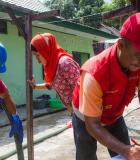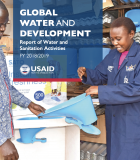U.S.-Haiti Feed the Future Partnership: Northern Corridor
Agricultural productivity in Haiti has systematically declined in the last three decades. A shift to annual cropping on steep slopes has caused erosion and exacerbated flooding that affects the slopes, as well as the productive plain areas. The magnitude of flooding has increased, water supplies have become much more erratic, and both lives and livelihoods are under threat. At the same time, ground water levels in the plains have dropped substantially due to growing urban demand, and water has become increasingly brackish as seawater replaces fresh water.
The Feed the Future North (FTFN) project is a multisectoral program, which aims to raise agricultural incomes in northern Haiti. The partnership will achieve this through key investments in farm productivity, natural resource management, marketing systems, agribusinesses, and agricultural infrastructure. Geographically, the project will work in the plains and their associated watersheds in the North and the Northeast departments. It will focus its investments in five key crops—corn, beans, rice, plantains, and cocoa—and include complementary investments in other agricultural products.
The project will adhere to and mainstream a number of core principles; it will: be country-led, build capacity of Haitian institutions, coordinate with and leverage the work of other donors and stakeholders, be results-oriented, be market-driven, achieve scale through demonstration effects, and consider the gender and environmental implications of its work.
Activity Description
The objective of the project is to increase agricultural incomes in Haiti’s Northern Corridor for at least 21,500 rural households. The activities include the following:
- Agricultural productivity increased through generation and transfer of innovative technologies, increased access to inputs, and rehabilitation of irrigation systems;
- Watershed stability above selected plains improved through good governance, farm-level investments, public works, and crisis management;
- Agricultural markets strengthened through improved access to storage and processing facilities and rural roads and increased access to financial products and market information systems.
Expected Outcomes
The expected outcomes are a:
- Doubling in agricultural incomes for 40,000 households in Northern Haiti;
- Doubling in export volume for cocoa produced by supported farmers;
- Introducing productivity enhancing technologies, rehabilitating/ building agricultural and flood-control infrastructure, strengthening local institutions, and building critical agricultural skills.
Actual Outcomes
The outcomes of the program were that:
- In the project’s first year, 7,007 farmers were trained to apply new agricultural technologies.
- Nearly 5,000 rural households benefitted directly from the project.
- Nearly 3,000 people received training in natural resource management or biodiversity conservation.
- The program organized smallholder cacao farmers into seller groups that sell directly to Novella, Haiti’s biggest cacao exporter. As of June 2016, 280 seller groups have formed, 118 of which have already signed direct trading agreements with Novella.





